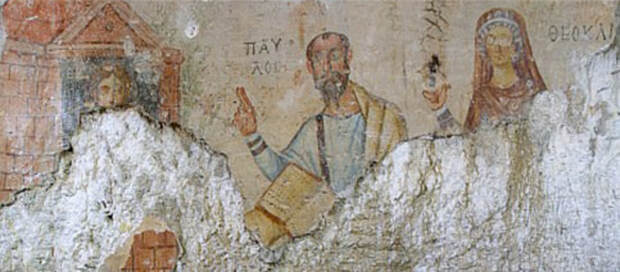Discover Ephesus and Top Destinations in Western Turkey with an expert tour guide and a TripAdvisor Winner for 13 consecutive years.
Thecla was a saint of the early Christian Church, and a disciple of Paul the ApostleSaint Thecla was a noblewoman from Iconium (modern-day Konya in Turkey) in the 1st century AD. She was converted to Christianity after hearing St. Paul's teachings. She defied societal expectations by choosing a life of religious devotion over marriage. She faced persecution for her faith, surviving various trials and she became a missionary, traveling and spreading Christianity. The excavations in Ephesus have unveiled a significant discovery of a cave showcasing vital Early Christian frescoes and inscriptions. Situated on the southern side of ancient Ephesus, this find on the slopes is of great importance. Among the treasures found within are clear depictions of notable figures like Apostle Paul, Saint Thecla, and Thecla's mother Theocleia. These depictions from 5th century AD, sheds light on the rich religious history and cultural significance of Ephesus, offering valuable insights into Early Christian presence and practices. In the portrayal of Saint Thecla observing Saint Paul outside the window, a profound sense of reverence and storytelling is captured. The image delicately showcases Saint Paul seated with a book, embodying wisdom and devotion, as he gestures towards his audience with an eloquent preaching stance. Positioned behind Paul, Saint Thecla's mother adds a layer of caution and guidance with her raised hand, enhancing the narrative with an element of concern and protection.
Documentary of Cave of St. Paul in EphesusStory of Saint TheclaThecla is NOT mentioned in the book of Acts in the New Testament. The book of Acts chronicles the early history of the Christian church, focusing on the apostles and the spread of Christianity. Thecla was mentioned in apocryphal texts which are considered non-canonical, meaning their accuracy is uncertain. St. Paul during his second missionary, stopped in Iconium (Modern name Konya in Central Anatolia) where Thecla supposedly lived. In a peculiar turn of events, St. Paul found himself at the residence of Onesiphorus, where he delivered a compelling speech on detaching oneself from worldly pleasures and seeking a higher connection with God. A 17-year-old Thecla, residing nearby, attentively absorbed his words and was deeply moved by the impassioned message. The impact was so profound that Thecla made the bold decision to end her engagement, much to the dismay of her mother and intended spouse. The mother of Thecla: Theocleia complained about Paul to Iconium Governor Castillius, leading to the imprisonment of Paul. In an unexpected turn of events, Thela managed to outwit the prison guard by offering him a silver mirror. She successfully reached St. Paul. Displaying a remarkable act of reverence, Thecla knelt before Paul, honoring him with a kiss on his chains and attentively absorbing his counsel. As news of this encounter spread, causing a stir among Thecla's family and the Governor, the repercussions were severe as Paul faced physical abuse and public humiliation before being driven out of the city. Thecla was senteced to be burned. In a dramatic turn of events and miracles, the rain unexpectedly extinguishes the flames that want to consume her, allowing her to escape bravely. She cunningly disguises herself as a man and joins with Paul, seeking sanctuary in the serenity of a cemetery outside the city walls. Their journey takes an unexpected turn when they reach Psidian Antioch, they get into trouble again because of a nobleman named Alexandros who was in love with Thecla. This time she is put on a show in the arena to be torn apart by predators. Miracles happen and the animals do not attack Thecla and they protect her. Impressed by this and convinced by miraculous powers, the authorized governor of the region releases Thecla. Upon sharing her harrowing experience with Paul, Thecla bid Paul farewell before journeying to Iconium and subsequently to Seleucia. Taking refuge in a cave, Thecla dedicated herself to enlightening the people around her with unwavering determination. Through her words and actions, she sought to bring wisdom and hope to those in need. Thecla's mysterious disappearance in this cave has sparked widespread fascination among the surrounding Christians, leading them to perceive the location as sacred. The feast of St. Thecla, honoring her as the first female teacher and healer, is an annual celebration held in the cave church in Seleucia that served as a clandestine place of worship until 312 AD. Recognized on September 23 by the Catholic Church and September 24 by the Orthodox Church, this historical site attracted visitors from far and wide, including individuals from Cyprus and Jerusalem, captivated by St. Thecla's renowned legacy. This revered location, both revered as a pilgrimage site and commemorated as a place of martyrdom, has welcomed the presence of numerous notable figures over the years, adding to its significance and historical importance.
0 Comments
Leave a Reply. |
Ephesus Travel Guideby TransBalkan Tours is a fully licenced tour operator since 1963 and a member of TURSAB. Ephesus Tour from Kusadasi Port
Ephesus Tour from Izmir Ephesus Tour from Selcuk Ephesus Tour Guide Kusadasi Airport Transfer Kusadasi Pamukkale Tour Ephesus Biblical Tour Istanbul Ephesus Tour Ephesus Guided Tour Ephesus Shore Excursions Efes Tur Rehberi Ephesus Walking Tour 7 Churches Tour Turkey Categories
All
Archives
July 2024
|









 RSS Feed
RSS Feed
